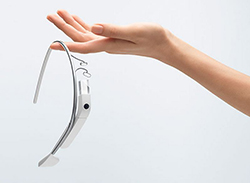Are You Ready for Wearable Computers?
-
-
slice.mit.edu
Filed Under
Recommended
For over twenty years, Starner has been one of only a handful of pioneers to go where no humans have gone before, sporting a wearable computer in front of his eye.

Later this year, Starner is about to have a lot of company. With the launch of Google Glass sometime in late 2013, Starner’s 20-year beta test will end.
In late February, a group of Google Explorers, who essentially won the right to be early adopters, started seeing their world as Starner does, through a computer screen.
Starner designed and modified his own version over the years; Google’s first customers paid $1,500 for the off-the-shelf version that Starner helped design. Google Glass strives to contain everything in one device: microphone, camera, CPU and a mini-projector that will flash calendar reminders, text messages, directions and whatever else you wish it to onto a half-inch transparent area of one lens.
Serving as Technical Lead/Manager for Google alongside some former classmates, Starner has given talks on wearable computing for some time. He is quick to note, however, that we have all used wearable computers—in the form of heart-rate monitors, wristwatches and, of course, cell phones.
Long before there was industry research and symposia on the topic of wearable computers, Starner roamed the streets of Cambridge with his early model, exploring the intersections of virtual and real worlds—while crossing back and forth over a very real Mass Ave.

"We really believe that there's much more convenient ways of having a computer augment your life than to take a phone out of your pocket," Starner said in an interview this month. With a wearable computer, he says, "You get really good at using 30-second chunks of time.”
Aside from Google Glass, Starner’s lab at Georgia Tech, where he is director of the Contextual Computing Group, works on other types of wearable computing, like a glove with finger pulsations that can teach you to play Beethoven while you multitask. That glove also does wonders for stroke victims, Starner learned.
Clearly, wearable computing can make such profound impacts in people’s lives. Until then, Starner will have to be patient, fielding all the controversial questions about privacy and copyright and identity when the world puts on its glasses for the first time.







